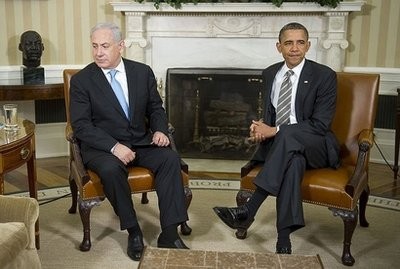Israeli leader Benjamin Netanyahu has warned Barack Obama against chasing what he called a Middle East peace "based on illusions" as he lectured the US president amid a widening rift in US-Israeli ties.

In a dramatic Oval Office appearance, after 90 minutes of talks Friday, Prime Minister Netanyahu emphatically vowed Israel would never return to its 1967 borders and laid down a set of non-negotiable conditions for peace talks.
The exchange, which left hopes for Obama's peace drive more remote than ever, came a day after the US president called on Israel to accept a return to territorial lines in place before the 1967 Arab-Israeli war, with mutual land swaps with Palestinians to frame a secure peace.
But Netanyahu seized on the notion that he was being asked to return solely to Israel's 1967 footprint, which he said was nine miles wide in places and half the size of the "Beltway" highway surrounding Washington.
"While Israel is prepared to make generous compromises for peace, it cannot go back to the 1967 lines -- because these lines are indefensible," Netanyahu said, looking Obama squarely in the eye.
Israelis argue that returning to the former border configuration would leave Israeli population centers vulnerable and mean uprooting hundreds of thousands of settlers from homes in the West Bank and east Jerusalem.
Netanyahu did not however mention the second part of Obama's stipulation -- namely that land swaps between Israel and the Palestinians, would change those 1967 lines to ensure two secure, contiguous states.
The White House insisted that it had never said that Israel should return to a narrow definition of its 1967 territorial lines.
Asked whether Netanyahu was willfully misinterpreting Obama's remarks, White House spokesman Jay Carney said such an observation was "interesting."
Privately, White House officials appeared infuriated by Netanyahu's combative approach, which even included a lecture for Obama on the historic struggles of the Jewish people.
In his first reaction to Obama's comments on the border issue, in a major speech on the Middle East on Thursday, Palestinian president Mahmud Abbas said that Obama should press Netanyahu to accept his position.
"Netanyahu's position is an official rejection of Mr Obama's initiative, of international legitimacy and of international law."
Obama admitted that he had Netanyahu had "differences" on language and formulations over the best approach to reviving peace talks stalled since last year, but saw a moment of opportunity amid the "Arab spring."
"I think that it is possible for us to shape a deal that allows Israel to secure itself, not to be vulnerable, but also allows it to resolve what has obviously been a wrenching issue for both peoples for decades now."
Obama also noted that he shared Israel's concerns over Syria and Iran and backed the Israeli position on the tie up between the Palestinian Fatah movement and the Islamist group Hamas.
Netanyahu said Abbas had to pick between Hamas, which advocates Israel's destruction and peace, or making peace with Israel.
The Israeli leader then launched into a history lesson of the struggles of the Jewish people, which Obama watched from a nearby chair, his hand over his mouth.
"A peace based on illusions will crash eventually on the rocks of Middle Eastern reality," Netanyahu said.
"We don't have a lot of margin for error... because, Mr President, history will not give the Jewish people another chance."
After the talks, a senior Israeli official accused Obama of raising "unreasonable expectations" that could set the peace process back "dozens of years" by seeking a Middle East deal based on the 1967 borders.
"We had to put our foot down," he added.
Analysts said Obama became the first president to specifically state that the 1967 borders should be the basis for peace negotiations between Israel and the Palestinians, shut down over a settlements row last year.
But they also warned the statement could cost him support during next year'e elections among Jewish and pro-Israel voters.
"A lot of Democrats are not going to agree with this, and a lot of Democrats are not going to be Democratic in the voting booth," said New York political strategist Hank Sheinkopf.
On Sunday, Obama will address the powerful Israel lobby, the American Israel Public Affairs Committee (AIPAC) before heading off on a week-long trip to Europe.
Netanyahu will also speak to AIPAC and will make a joint address to Congress next week, encouraged by Republican leaders who support his position.
























